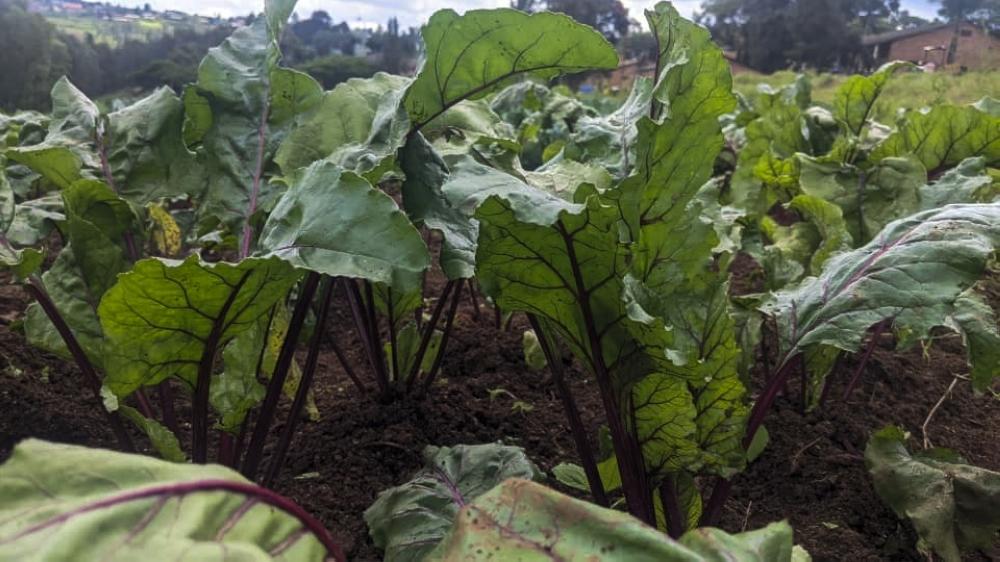Africa-Press – Rwanda. Jean Pierre Munyemana has been a beetroot farmer for only three years now, having started out in 2022 when he spotted an opportunity for what he thought was a profitable crop.
At the time, he started growing beetroot on just 80 ares across Rubavu and Nyabihu districts in the Western Province, before expanding his farmland to accommodate growing demand.
“In the beginning, I was harvesting around 1.2 tonnes from 80 ares. Now, I harvest over 3 tonnes from two hectares—150 ares in Rubavu and 50 ares in Nyabihu,” he tells The New Times.
Munyemana is convinced that he wasn’t wrong in his choice to venture into beetroot farming. Although prices fluctuate with demand, the farmer says the market value for this crop is undeniable.
“When the market isn’t favourable, a kilo goes for around Rwf500. During better times, it can reach Rwf800,” he says, revealing that he currently earns as much as Rwf1.8 million on average per season.
His main market is the DR Congo where he exports majority of his produce. “In DR Congo, they pay handsomely – Rwf800 per kilogram. They even offer Rwf500 for just one beetroot, which is locally sold at Rwf300.”
Munyemana’s plan is to diversify into processing juice and other bi-products.
“I want to focus on processing,” he notes, adding that beetroot juice is relatively easy to produce.“Selling juice will help me increase my income and avoid losses during delayed sales.”
His story is not far from that of many other farmers who ventured into the same farming business.
For Dieudonné Haragirimana, a new entrant to beetroot farming, he started out on half a hectare, convinced that there were hidden opportunities in the business and across the sector.
“I already had a market before I even started planting,” he narrates. With less than Rwf70,000 invested so far, he expects to harvest around 400 kilogrammes within a month.
Haragirimana is growing a variety known as Detroit Dark Red Beetroot, which he described as “high-yielding with large roots.” His journey, however, was not without challenges. Heavy rains affected his early seedlings.
“I had to mulch the soil to retain heat and used fungicides to revive the crop,” he explained, adding that his efforts paid off, and the crop has recovered well.
Need for improved seeds
Despite the progress, farmers are calling for better seed performance, saying the current yields on the market are not reliable.
“Some seeds germinate poorly or inconsistently, and we don’t understand why. There needs to be an improvement,” Munyemana says.
The main beetroot varieties cultivated in Rwanda include Detroit Dark Red, and Red Ball, which mature in about 60 days, Merlin in 55 days, and Crimson Globe, according to Florence Uwamahoro, Deputy Director General for Agricultural Development at the Rwanda Agriculture and Animal Resources Development Board (RAB).
“Farmers are advised not to plant beetroots in fields where beetroot, spinach, or amaranth were previously grown,” she explains, recommending early weeding with dry grass before planting, followed by consistent removal of weeds whenever they appear.
“Watering is crucial, especially when rainfall is inadequate. It should be done twice a week, but without wetting the leaves to avoid disease,” she adds.
According to Uwamahoro, it is recommended to apply 8 grams of DAP and 4 grams of KCl per plant a week after planting. Between 30 and 45 days later, farmers should add 2 grams of Urea around the base of each plant.
At the same time, she adds, crops should be inspected at least three times weekly to detect pests or disease early, with prompt treatment where necessary.
“For harvesting, farmers should cut only the top leaves, leaving at least one centimetre attached to the tuber to minimise sap loss and prolong shelf life,” she says.
No national beetroot devt programme
Beetroot fall under the general category of vegetables in Rwanda. There are currently no specific national statistics available for beetroot farming or production, and development plans for the crop are bundled with broader vegetable programmes.
According to the National Institute of Statistics of Rwanda (NISR), vegetables were cultivated on 19,142 hectares in Season A of 2024, yielding 145,933 tonnes. In Season B, 20,161 hectares produced 177,549 tonnes, and in Season C, 5,738 hectares yielded 65,980 tonnes.
The Ministry of Agriculture’s annual report for the 2023–2024 fiscal year showed that Rwanda exported 61,999 tonnes of vegetables, generating $42.34 million (approx. Rwf59.9 billion).
The DR Congo accounted for 67 per cent of the exports, followed by the United Kingdom which accounted for 13 per cent, and France which accounted for 4 per cent, among other destinations.
Beetroot farmers benefit from the agricultural subsidy. A ministerial order for 2025 indicates that vegetables are among the crops receiving support for chemical fertilisers in Season B.
The crop is rich in essential vitamins such as B9 and C, and minerals including iron, calcium, and manganese. They are also associated with important health benefits, such as lowering blood pressure and improving digestion.
For More News And Analysis About Rwanda Follow Africa-Press






